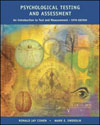Assumption 1: Psychological traits and states exist.
Assumption 2: Psychological traits and states can be quantified and measured.
Assumption 3: Various
methods of measuring aspects of the same thing can be useful.
Assumption 4: Assessment can provide answers to some of life's most momentous questions.
Assumption 5: Assessment can pinpoint phenomena that require further attention or study.
Assumption 6: Many sources of data are part of the assessment process.
Assumption 7: Various sources of error are part of the assessment process.
Assumption 8: Tests and other measurement techniques have strengths and weaknesses.
Assumption 9: Test-related behavior predicts non--test-related behavior.
Assumption 10: Present-day behavior sampling predicts future behavior.
Assumption 11: Testing and assessment can be conducted in a fair and unbiased manner.
Assumption 12: Testing and assessment benefit society.



 2002 McGraw-Hill Higher Education
2002 McGraw-Hill Higher Education